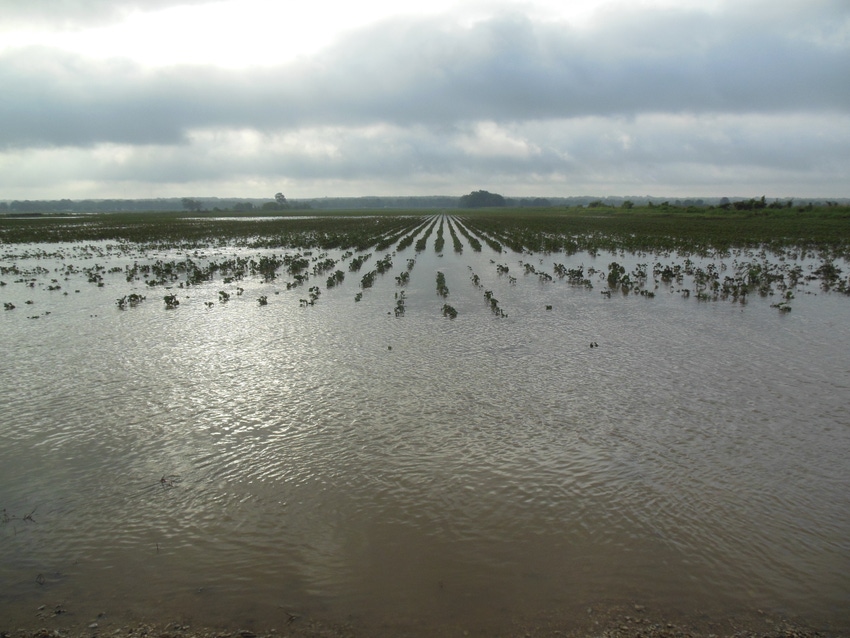
Massive weekend rains have left thousands of Arkansas row-crop acres underwater.
“Unfortunately, we’ve got crops swimming in St. Francis County,” says Mitch Crow, St. Francis County Extension staff chair. “I’ve heard from farmers that got anywhere from 6 inches to 11 inches of rain. Areas around Widener and Palestine received 11 inches. Supposedly, an area around Forrest City got 13 inches.”
Crow says preliminary counts show about 15,000 county acres underwater with a forecast claiming a 30 percent chance for more rain later this week. Estimates are that at least 75,000 acres could be in trouble across the five most affected counties.
“We got 6 inches of rain at my house in Jackson County,” says Bill Robertson, Arkansas Extension cotton specialist. “Driving here to Marianna today, I saw a lot of fields still underwater. There are a bunch of fields like that in southern Jackson County into Woodruff County and over to Cross County.
“Producers in Palestine and Forrest City have told me they got 11 inches of rain. One farmer said, ‘Bill, I got at least eight inches but I’m not sure how much more. All my rain gauge holds is eight inches.’”
Cotton
The cotton in St. Francis and Lee counties is the most stressed Robertson has seen. “There’s been too much moisture the whole year. It doesn’t have much size on it and was just beginning to turn around when this latest series of big rains swept through. I just had a farmer tell me, ‘I don’t have any cotton in standing water but it still looks iffy because it’s had wet feet for its whole life.’
“Situations where you have three or four fields -- say 700 to 800 acres -- that drain into one ditch are still flooded and will be for a while.”
Due to the flooding, Robertson says there is “no doubt” some cotton will be lost. And for the cotton that was already struggling the recent rains will only slow it down more. Add in the predicted heat “and that will put some cotton in even more trouble.”
Crow agrees. “The cotton in these wet areas has had trouble -- it may not have much growth on top and doesn’t have much root mass either. It can’t grow roots where there’s no oxygen.
“One of the issues we’ll be facing on these flooded acres is the temperatures. It’s supposed to be around 90 degrees for the next couple of days and then cool down to the 80s. Ninety degree temperatures won’t be friendly to the beans and cotton that’s underwater.”
Soybeans/replanting
Leading up to this, soybeans had already been through a hard spring. “That’s especially true north of Jefferson County towards Helena and north of I-40,” says Jeremy Ross, Arkansas Extension soybean specialist. “There’s water over roads in Woodruff County that I’ve been told have never been under before.”
Soybeans won’t be able to hold out for long in these conditions, says Ross. “If water backs off them in 24 hours, they’ll usually come out okay. But that’s not likely in some of these fields with the volume of rain. The Cache River is set for flood stage and the White River is full.
“Add hot, sunny weather to that and it begins to look bleak. Those beans will just cook in that water.”
Replanting, say all interviewed, is a tough proposition.
“Once we get to June 15, for every day of delayed planting the crop experiences one to two percent of yield loss per day,” says Ross. “Hit July 1 and that percentage jumps to three or four percent per day.
“So, if a producer starts replanting today, best case, he’s going to see a yield loss of at least 15 percent compared to soybeans planted in a timely manner.
“Realistically, in some of these fields it’ll take two or three days for the water to roll off and two or three more to dry down enough to get machinery in. Well, that means planting around July 7 to July 10 and you’re looking at a major yield hit.”
Despite the late date, Crow expects some replanting to occur. He worries for the soybeans that water has backed off. “There are some beans that are extremely muddy. They’re brown and look terrible. But I think a lot of those acres will pull through and be okay.”
Robertson says there’s no point in replanting cotton. “It’s too late. Some of the lost acres may go to soybeans but it’s also late to plant those. In a lot of cotton that was having trouble earlier this season, farmers have already gone in, squared off the bottoms and destroyed the cotton, and planted soybeans back. It’s very difficult to manage pockets of soybeans in cotton fields but farmers are forced into action.
“You know how freshly plowed soil smells good? Well, the soils now, because they’re so wet and hot, have the musty, stale, funky smell that you get standing next to a lake during the summer. I was just standing in a field thinking, ‘I might as well be beside a lake.’”
Once the water backs off, Robertson expects it will be hard going forward. “There will be all kinds of issues. Keeping ahead of weeds is going to be very tough for the rest of the year.
“Here’s the thing: theoretically, cotton should be in better shape than other crops because it’s planted on more well-drained soils. Plus, with all the rains this spring, many of the weaker spots in cotton fields have already been ‘weeded out.’ Even so, I expect a lot of our cotton to struggle.”
Crow says he’s heard from many worried farmers and consultants. “That’s obviously understandable. All anyone can do right now is just wait, though. Hopefully, by the end of the week most of these underwater fields will be drained down and there will be some new growth.”
About the Author(s)
You May Also Like




